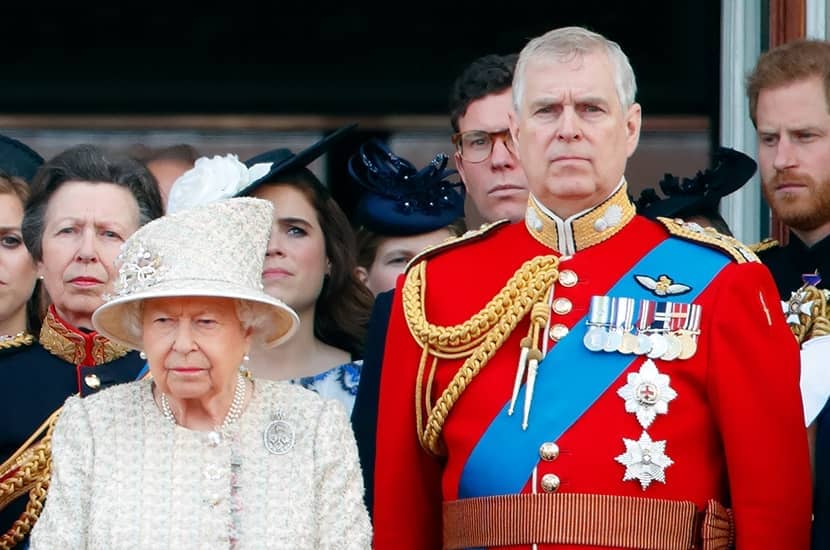Prince Andrew’s decision to settle his case with Virginia Giuffre means he will be spared the potentially humiliating ordeal of a jury trial. It also means that, in the public’s opinion, he will forever occupy a no-man’s land between guilt and exoneration. Even though he has accepted no liability in the case, a return to royal life is surely impossible. As he celebrates his 62nd birthday this weekend, he must contemplate life as a retired royal.
However Andrew might feel about his fate, it will bring relief for the monarchy. The darkest of clouds is clearing and the Queen can mark her 70th year on the throne without the reputational damage that would inevitably have accompanied a trial. We cannot know what discussions have taken place between the Queen and her second (and reputedly favourite) son — but it would come as no surprise if the decision to settle the case was taken in Buckingham Palace.
In so doing, the Queen appears to have resolved the third major issue that has been threatening to destabilise the monarchy: the thorny questions over what to do about Prince Andrew, Prince Harry and Camilla.
The Queen has brought a discipline to the institution that at times the younger royals rub up against
With her restraint and sense of service, the Queen has brought a discipline to the institution that at times the younger royals rub up against. But what happens when she is no longer there to steer her successors, especially those who may wish to launch themselves as TV celebrities, commentators or campaigners? Self-indulgence tests public support, which is why decay and eventual collapse has been the story of many a European monarchy over the past century.
The problem is fairly common: as a family grows and the younger generations enter adulthood, life takes its toll and tensions emerge. Britain warmly welcomed Meghan Markle, but she found the life of a royal unsuitable for her. Hollywood actresses can happily lecture people about climate change while travelling on private jets to Elton John’s villa, but a royal is subject to far greater scrutiny.
When Meghan and Harry sought to launch their own House of Sussex — a woke branch of the monarchy operating independently of Buckingham Palace — it seemed briefly as if the Queen was losing control. She then asked Harry to choose: did he want the life of a royal, with the accompanying restraints, or to live like a celebrity with all of the freedom and often chaos that brings? Harry decided upon the latter and soon revealed his lack of worldliness in that now infamous interview with Oprah Winfrey. He seemed genuinely shocked that his family had cut him off financially. It did not seem to occur to him that most 36-year-olds are not reliant on their parents and grandparents.
The Queen’s response to that interview — with its memorable phrase ‘recollections may vary’ — was a masterstroke of diplomacy. In spite of the deep hurt that her grandson and granddaughter-in-law must have caused her in the last weeks of her husband’s life, she embraced the couple as members of her private family while reminding them that there would be no return to royal life. They have thrown themselves in with the ephemeral world of celebrity. They must live as all Hollywood stars have to. They are only as good as their last Spotify podcast or Net-flix show.
No less tricky for the Queen was the question of how to handle the issue of the Duchess of Cornwall. It has been confirmed that Camilla will indeed become Queen Consort upon Prince Charles’s accession to the throne. It would have seemed awkwardly out of tune with contemporary society to have denied her the honour on the grounds that she is his second spouse. On the other hand, his divorce and marriage were not allowed to pass without a mark of disapproval. Camilla had to serve a probationary period.
Where does all this leave the monarchy? Back where we started. Barbados has chosen to become a republic, and other commonwealth nations may follow; the end of the Queen’s reign will likely be the trigger if they do. Yet there is little public appetite in Britain for the country to be anything other than what it already is: a constitutional monarchy. No system of governance is perfect, but we can be thankful that we have an arrangement where political power is tempered by the permanence of a family who represent the British people. Those who rail against royal privilege must ask: would they really be happier if Boris Johnson was in that palace, as president or head of state?
In this jubilee year, we celebrate our longest-serving monarch reaching 70 years on the throne: an achievement which, among European monarchs, has only been surpassed by Louis XIV of France. When her reign reaches its end, we can have confidence that the monarchy will continue. That is down not just to the solidity of the institution itself, but to the enduring prudence of the Queen.






Comments